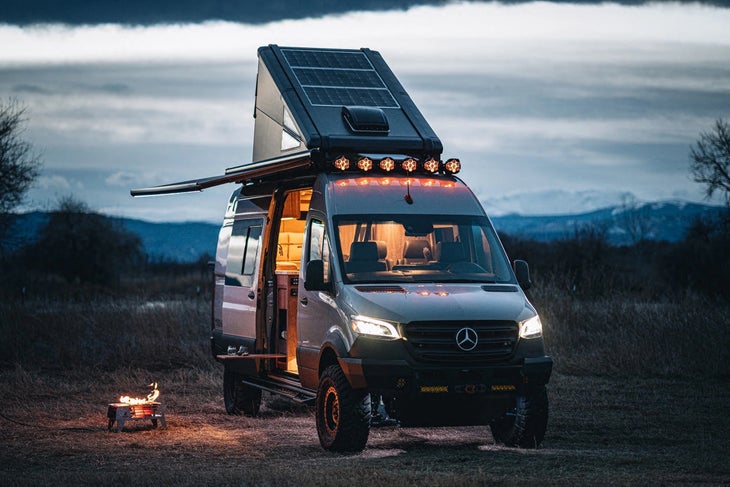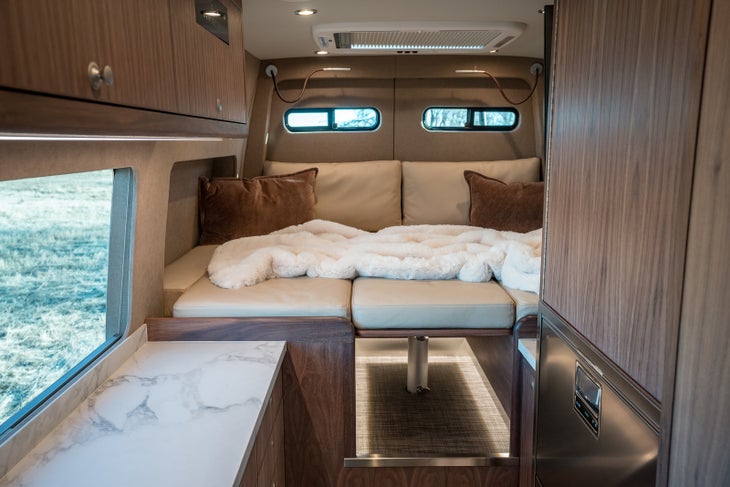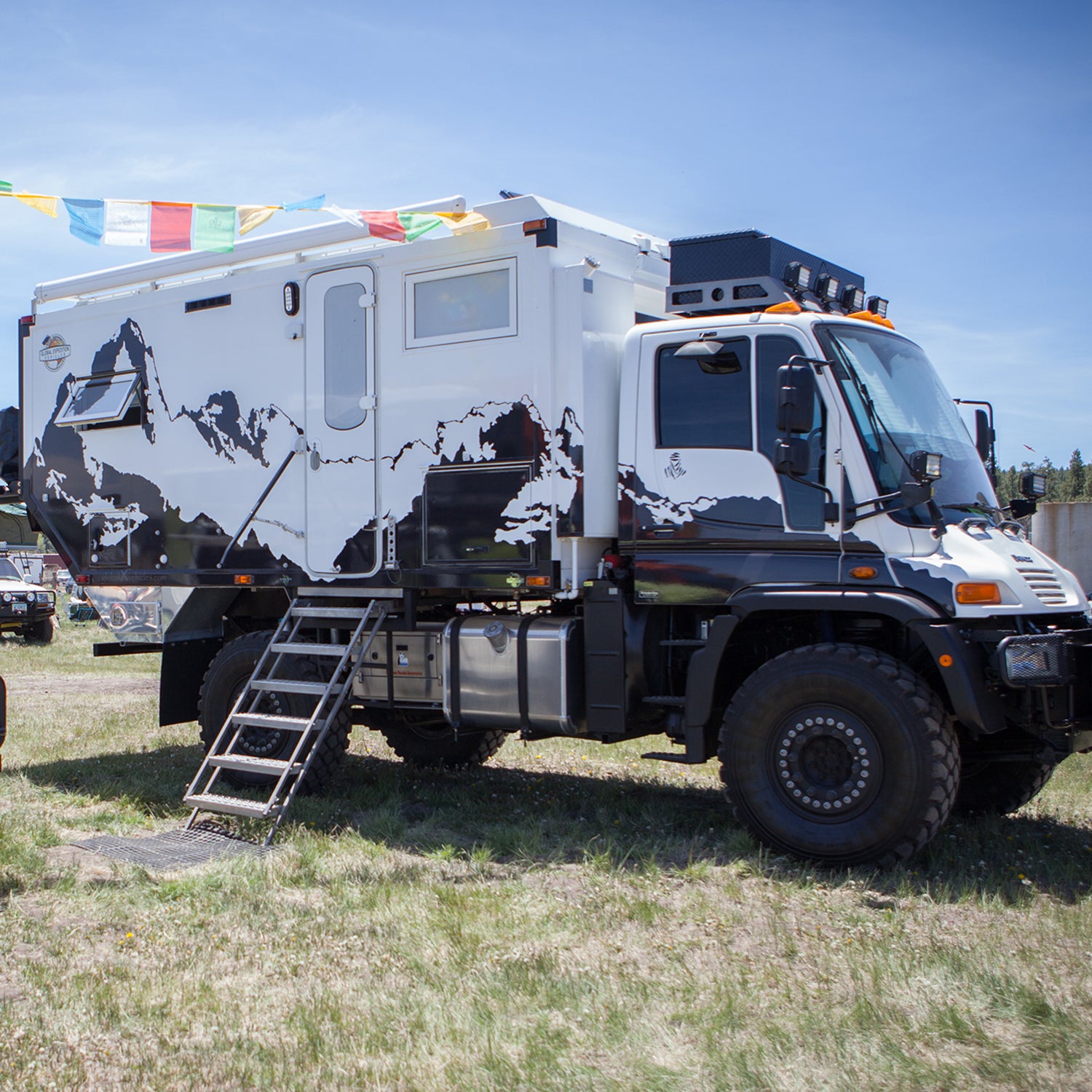Overlanding seems to have become all about creating the most ultra-luxurious or ultra-accessorized rig possible. If I’ve learned one thing in all the camper and trailer testing I’ve done, it’s simpler is better. Less stuff to break means more time having fun outside.
People spend stupid amounts of money building adventure rigs, and pour tons of their own time and energy into creating luxurious mobile dwellings for themselves. They’re effectively creating an AirBnB on wheels, and I fear they’re missing the point of why they got into it in the first place—you know, to go camping.
Attend an Overland Expo show these days, or arrive at a popular dispersed camping area like Moab, Utah or Fruita, Colorado, and you’ll see what I’m talking about. In a capitalist society that values consumption, and at a time where we’re constantly fed a barrage of content designed to make us want to buy things, it’s easy to get sucked into the whirlpool of wanting more.
The point of overlanding, to me at least, is to use a vehicle to better enable human-powered adventures and make camping a little easier and more comfortable. We’ve now gotten to a point where ease and comfort have morphed into luxury and excess, and it’s time to take a hard look at that.
“The Most Advanced Systems and Premium Components Money Can Buy”
Before I go any further, I want to make clear that I’m guilty of this too—hell, I write about campers and trailers for a living. My wife and I ended up with our most recent adventure rig, a 19-foot Airstream trailer, because we kept seeking out more and more amenities in a camper. Like a lot of folks, we wanted something that would make boondocking more comfortable during longer trips—and the Airstream had all the bells and whistles, like a three-burner stove, an oven, a toilet and shower with hot water, A/C, and more.
Watch: Bryan Rogala’s DIY Truck Camper
This weekend, my wife and I went camping with friends at a gorgeous, off the beaten path state park near White Sands National Park. The campground is pretty standard, consisting of a couple of paved loops with a few tent sites and some with water and electric hookups. Our neighbors were some folks camped in a built on an industrial, military truck chassis with huge, mud-terrain tires that was clearly purpose-built for off-road exploration.
There’s an abundance of awesome dispersed camping in the area, and we couldn’t help but wonder why anybody who owned a nearly half-million-dollar expedition rig designed to stay off the grid for extended periods of time—complete with its own water-filtration system—would stay on a paved campground loop in a state park, or use the campground bathroom when I can guarantee you the one inside that vehicle was nicer. But hey, at least they rode their dirt bikes to the bathroom each morning.

When I see rigs like selling for over $530,000 fully kitted out with features like heated floors and a full bathroom, a 14KW lithium battery system, 70 gallons of water capacity, and “the most advanced systems and premium components money can buy or skilled hands can craft,” I can’t help but wonder what happens when one of those systems fails on the road.

I’ve witnessed water tanks leaking and pumps failing in fancy Sprinter conversions, and stood in the booth of a major overland trailer manufacturer at Overland Expo West as customer after customer came up to complain about cabinets falling off the walls, tank sensors failing, suspension components breaking, and more.
Is There No Middle Ground?
Rather than make campers and trailers that are as high tech and comfortable as possible, I want to see more manufacturers focus on simplicity and durability—after all, we already have the RV industry if we want cheaply-built “luxurious” rigs. It’s as if there’s no middle ground in the camper and trailer space these days—you either have to spend huge sums of money in the overland space to get something that’s truly well-built and won’t rattle apart on you, or you have to buy a cheap RV and cross your fingers.
To me, “overlanding” has always been more akin to car camping than extended, off-road journeys. It’s about having a rig capable enough to reach remote campsites without worry, and one that provides at least a bit more comfort during your stay than a traditional tent setup (especially in bad weather). That way, you can stay longer, sleep and eat better, and have more fun doing the other activities—like biking, hunting, fishing, etc.—you’ve traveled for in the first place.
The Skyloft Van is obviously an extreme example, but if you take a walk around an show, it feels like the whole industry is shifting towards luxury and complication and away from its sleeping-in-the-back-of-a-Land-Cruiser roots. Even traditional RV brands like have gotten into the overland game in recent years with the series of trailers.
While I fully support the notion of an RV being built for off-pavement use, I sometimes wonder what the point is of spending $120K on a trailer with features like a pass-thru slide out kitchen, on-demand hot water, ducted heating, and a tablet that remotely controls every system on the trailer. When you zoom out a bit, the whole point of a trailer, especially an “overland” trailer, is to go camping and spend time outside.
While all those luxuries will make you more comfortable, I’d bet a lot of money you still won’t be as comfortable as you would in a nice Airbnb or fancy hotel room somewhere.
Let’s say . You could book 480 nights in an Airbnb for the price of that $120K camper. If you camp a lot, say 50 nights a year, it’d take you 9.6 years of Airbnb stays to break even. That’s a lot of vacations.
Keep It Simple (and Functional)
My point isn’t to chastise anyone for having a lot of money to spend on a camper, or to suggest we should all just toughen up and sleep in a bivvy; it’s to remind folks, and the overland industry at large, that the goal of this hobby is to get outside and go camping, and that oftentimes unnecessary luxuries can get in the way of that. You can make camping extremely comfortable while still keeping things simple, after all.
Rather than overcomplicated rigs with fancy systems and every amenity under the sun, I’d like to see the overland industry and camper manufacturers focus on building simple, durable rigs with an emphasis on reliability and quality.
Give me an insulated box—with some lights, a heater, a basic hand-pump sink, and a Goal Zero for charging things—that’s able to withstand washboard roads and light off-roading than a luxury apartment on wheels with leather-wrapped dinette cushions and a washer and dryer (seriously). After all, nobody will care how warm the in-floor hydronic radiant heat system keeps their feet in the morning if it quits working after a year or needs constant maintenance to keep running.
I’d rather have a rig that’s easy to deal with, requires minimal maintenance, and enables my other hobbies and passions versus an overcomplicated Airbnb on wheels that in itself becomes an all-consuming hobby to maintain.
Related
The Best Tents for Camping in Comfort and Style
The Best Camping MattressesÂ
The Best Sleeping Bags for Frontcountry Escapes


